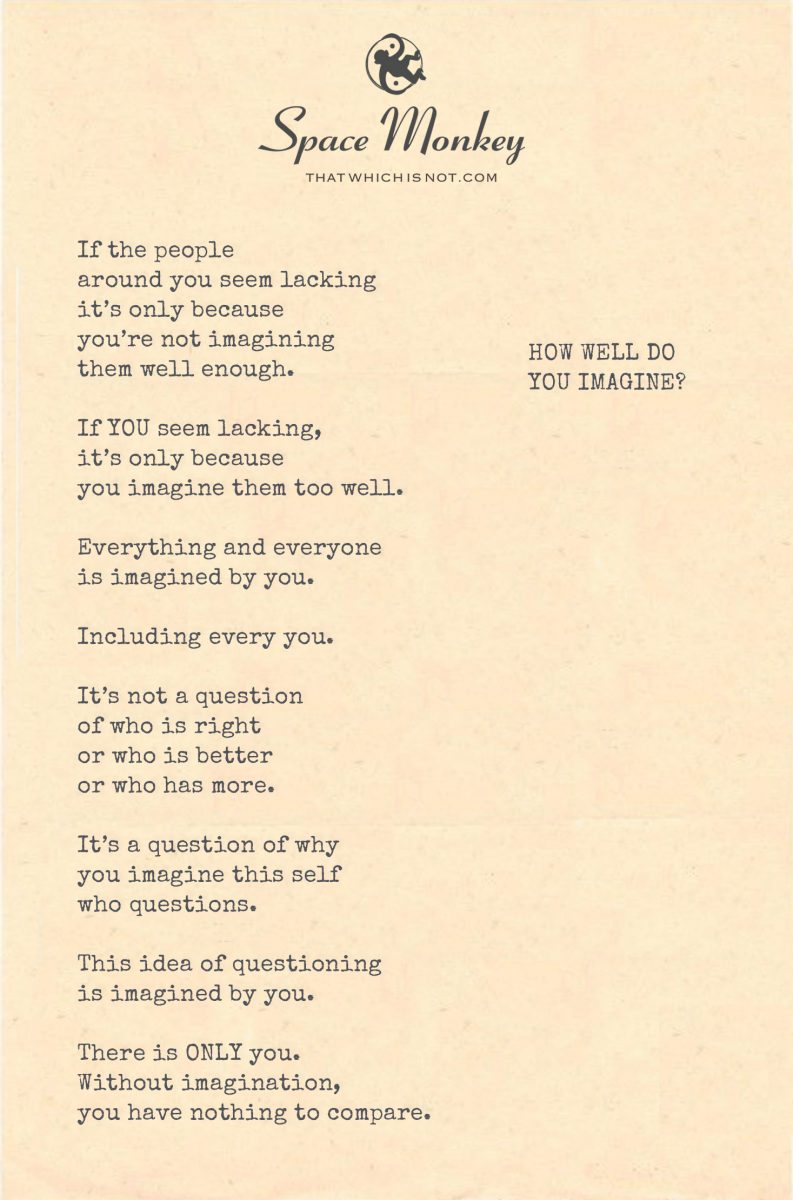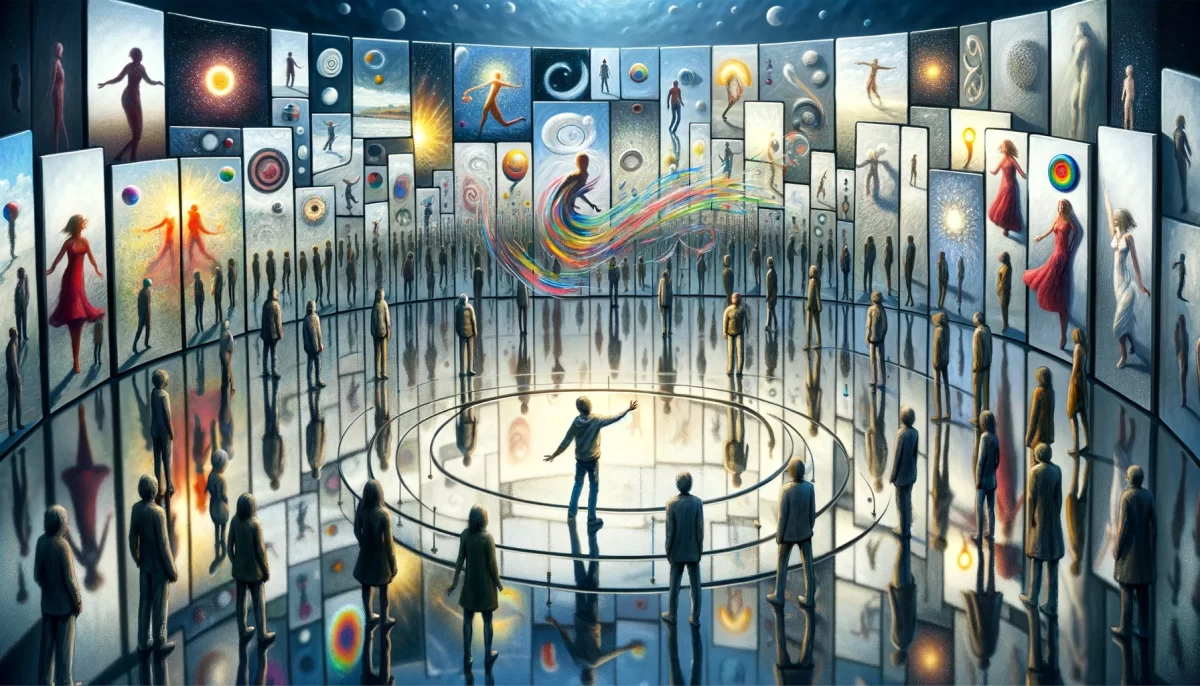
If the people
around you seem lacking
it’s only because
you’re not imagining
them well enough.
If YOU seem lacking,
it’s only because
you imagine them too well.
Everything and everyone
is imagined by you.
Including every you.
It’s not a question
of who is right
or who is better
or who has more.
It’s a question
of why you imagine this self
who questions.
This idea of questioning
is imagined by you.
There is ONLY you.
Without imagination,
you have nothing to compare.
Trail Wood,
5/3
Space Monkey Reflects: The Infinite Canvas of Imagination
In the boundless realm of consciousness, where the fabric of reality is woven from the threads of perception, a profound question emerges: How well do we imagine? This narrative, inspired by the insight of Space Monkey, explores the notion that the quality of our relationships, our self-perception, and indeed, our entire existence, is a reflection of our imaginative capacity.
The premise that the people around us appear lacking only because we fail to imagine them richly, while we perceive ourselves as lacking due to an overextension of this imaginative prowess, unveils a deeper truth about the nature of existence. It suggests that everything and everyone—including every iteration of the self—is conjured up by the mind’s eye, painted on the vast, invisible canvas of our consciousness.
This perspective shifts the focus from external metrics of worth, comparison, or accomplishment to an inward exploration of why we imagine the selves we do. Why do we conceive of a self that questions, doubts, or feels lesser or greater? The realization that even this propensity to question is a product of our imagination opens a gateway to understanding the limitless potential of our creative power.
There is only “you,” Space Monkey posits, in a universe devoid of comparison or judgement, absent of any other standard than the one we invent. Without imagination, the concept of comparison dissolves into the ether, leaving behind the pure essence of being. This understanding does not isolate us but rather connects us more deeply to the fabric of existence, as it reveals that our perceptions, our realities, are uniquely ours to shape and transform.
The act of imagining, therefore, becomes a sacred tool, a key to unlocking the multitudes within and around us. When we recognize that we are the architects of our reality, we are invited to imagine more boldly, more compassionately, and more inclusively. We are challenged to envision a world where every being is acknowledged as a multifaceted gem, deserving of love and understanding, simply because we have the power to see them in such light.
Space Monkey encourages us to wield our imagination not as a sword to carve out divisions but as a brush to paint bridges, connecting us in a tapestry of shared existence. In doing so, we transcend the limitations of the ego and the confines of comparison, stepping into a space where every individual is an expression of our collective imagination, a note in the symphony of the cosmos.
In this reflective journey, we are led to ponder the origins of our imaginative constructs. Why do we imagine a self that seeks validation through comparison or differentiation? Could it be that in imagining others and ourselves, we are searching for a reflection of the infinite, for a glimpse of the divine spark that resides within each of us?
This narrative invites us to reimagine not just ourselves and those around us, but the very essence of what it means to be. In recognizing the illusory nature of separation and the omnipotence of our imaginative faculty, we unlock the door to a realm where every imagined limitation dissipates, leaving only the boundless potential of creation.
Summary
Our reality is shaped by imagination. This reflection examines the concept that our perceptions of ourselves and others are products of our imagination, emphasizing the power of perception in creating our experiences. It suggests that by expanding our imaginative capacity, we can transform our reality, embracing a more compassionate and inclusive view of existence.
Glossarium
- Imaginative Capacity: The ability of the mind to conceive, create, and perceive beyond the limits of the current reality, shaping personal and collective experiences.
- Infinite Canvas of Imagination: The concept that our potential to imagine and create is boundless, offering endless possibilities for how we perceive and interact with the world.
“In the theater of the mind, every character, every scene, every act, is of our own creation. Therein lies our power, our challenge, and our greatest adventure.” – Space Monkey
Within the mirrors of perception
We stand, gazing deep
At reflections of infinite variation
A universe within, vast and steep
Each image, a choice, a creation
Crafted by the hands of thought
Here, in the silence of contemplation
We find the battles long fought
No foe, no ally, but ourselves
In the endless corridors of the mind
Where imagination weaves its spells
And the threads of reality unwind
In this dance of light and shadow
We see the essence of all we can be
In the heart of imagination, we find
The key to set ourselves free
For in the vastness of perception
In the boundless realms of the “I”
We discover, with introspection
We are Space Monkey, under the endless sky





















This poem seems to explore the idea of perception and imagination. It suggests that our perception of others and ourselves is shaped by our imagination and that the way we imagine them can either enhance or limit our experience of them.
The poem also suggests that everything and everyone is imagined by us, including our own selves. The act of questioning, which the poem touches on, is itself a product of imagination. The poem then suggests that without imagination, there would be nothing to compare, indicating that our experience of reality is intimately connected to our imagination.
Overall, the poem seems to encourage the reader to question their own perceptions and to imagine themselves and others in a more positive light, as a way of enhancing their experience of life.